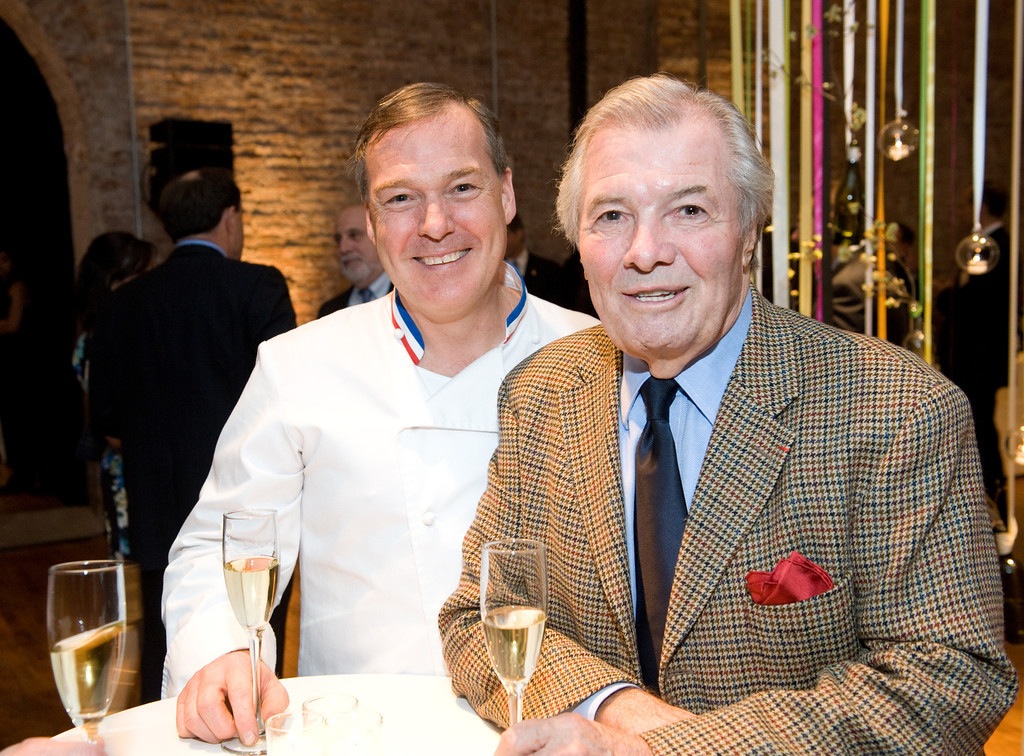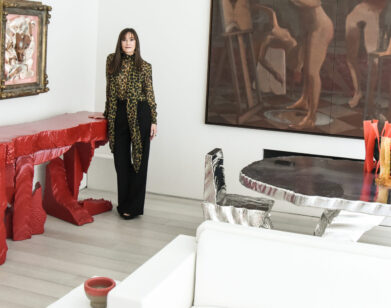Jacques Pépin is Not a Mallow Man

ABOVE: JACQUES PÉPIN (RIGHT) WITH JACQUES TORRES AT LAST NIGHT’S UNIVERSITY SETTLEMENT DINNER.
Master Chef Jacques Pépin’s career speaks for itself: the 76-year-old chef is the author of more than 20 much-consulted cookbooks, including La Technique, La Methode, and both volumes of The Art of Cooking; a former personal chef to three French heads of state; a James Beard Award winner several times over; a Chevalier de L’Ordre des Arts et des Letters and recipient of the Légion d’honneur; and a Daytime Emmy Award winner (which he shared with Julia Child), among a multitude of other accomplishments.
These days, in addition to co-hosting the TV show Jacques Pépin Celebrates! with his daughter Claudine, Pépin is dedicated to doing good, routinely donating his time and skills to charitable causes. At last night’s annual University Settlement Fine Wine Dinner and Auction, Pépin teamed up with Master Pastry Chef Jacques Torres to create a five-course dinner for those lucky enough to attend the event, which raised more than a half-million dollars for the Settlement’s social programs. We caught Pépin over a glass of champagne to talk about Charles de Gaulle, Facebook’s fish, and whether master chefs actually eat the meals they dream up.
ALEXANDRIA SYMONDS: Can you tell me about your involvement with University Settlement?
JACQUES PÉPIN: Well, to start with, I drew up the menu that you have over there. At the French Culinary Institute, Marc Bauer is really one of our great chefs. We discussed the menu, the introduction, and how to do it, and so forth. So that was mostly my involvement—meaning I didn’t do anything and I get credit.
SYMONDS: You’ve prepared meals for some of the most historic figures of our time. Who was the most memorable?
PÉPIN: You know, it’s a different world now. Totally different world. I was chef to the French Presidents between ’56 and ’59, finished with de Gaulle, and during de Gaulle I remember serving Eisenhower, Nehru, Tito, Macmillan; those were the heads of state at the time. I never saw anyone. No one would ever, ever, ever come to the kitchen. You couldn’t even see them. You’d sneak a peek, you see them. No one ever came to tell you whether it was good or not.
SYMONDS: You never got any notes from anyone?
PÉPIN: No. In fact, when you’d get a note from someone, the government, [it meant] something was wrong. This was the way it was. Just [goes] to show you the way that [being a] chef has changed, you know—being on the bottom of the social scale and now being what we are, it’s incredible, it’s terrific. The menus that remain, for me, are really the menus that you have with your good friends, with your wife, with your mother, with your kids. These are what stay in your mind.
SYMONDS: In one of his books, Anthony Bourdain wrote about how for the very top haute chefs, it can be difficult to get a simple meal out—because every time you go to a restaurant, you get recognized, and the chef wants to pull out all his stops for you. Do you find that to be the case?
PÉPIN: Absolutely. And even when I was at Le Pavilion in New York, or younger when I was in Paris, working at all those great restaurants… You finish eating, or even doing a big dinner like tonight, in the kitchen—when you finish, you know what happens? Everyone sits down, you eat none of that food, you go get some cheese, bread, pâté, open a bottle of wine, and that’s it!
SYMONDS: I know in 2010, you and some of the other French Culinary Institute chefs prepared a prominent fundraising meal for the President. Now that campaign season is gearing up, do you think you’ll be taking part in any more political events?
PÉPIN: I don’t know! I cooked at the White House for Easter, last year, with Michelle Obama. But it more had to do with cooking from the organic garden, and her message. I took my daughter and granddaughter there, and they were really charming, it was great. I don’t know—if it comes about, I will do it!
SYMONDS: Do you see cooking as a political act? I think there’s sort of a discord in America around food.
PÉPIN: You know, yes. I mean, food can be utilized for economic reasons, like the grain embargo of Carter 40 years ago. You have a political decision, you are going to move the flow of food in a part of the world and not another part of the world. And certainly now, with the way the country is polarized and all that, you wouldn’t want to have a French menu, with a French thing—you’d be crucified! Or anything like that. You have to be a real American and apple pie and this and that.
SYMONDS: Are there any very popular dishes that just don’t do it for you, and you’ve never been able to understand why they’re popular?
PÉPIN: Marshmallows!
SYMONDS: What about unpopular dishes you wish were more popular?
PÉPIN: Oh, I mean, any stew of vegetables—not just sautéed vegetables, which we used to do too-cooked, and now it’s the opposite, everything is raw. But a stew of vegetables, well-done and all that, with some cheese on top, is like a meal in itself.
SYMONDS: Have you paid much attention to the Internet, and the way the Internet has democratized cooking? Do you think people in my generation are more likely to be adventurous with our cooking than our parents were?
PÉPIN: You know, I just came back from San Francisco yesterday—I spent one day at Google and one day at Facebook. Everyone looks like they are 14 years old. But I was amazed, in those two places, at the quality of what they do, the quality of the ingredients. I mean, at Google, they go get their fish at Half Moon Bay, and they get it from the fishermen before the people of Whole Foods get it.
SYMONDS: I didn’t know that!
PÉPIN: In addition, they bring it back and the people don’t pay! The employees don’t pay. Wow! I mean, this is amazing—the quality of what they do, and… Now, I think they should bring them wine. The only thing missing is wine. [laughs]
FOR MORE ON JACQUES PÉPIN, VISIT HIS WEBSITE.






